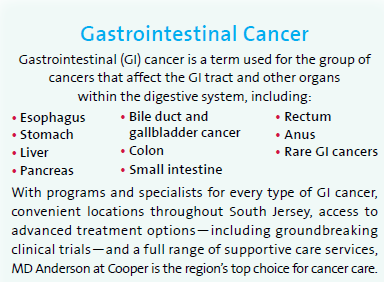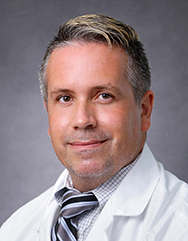Colorectal cancer, although one of the most curable types of cancer when caught at an early stage, remains the second leading cause of cancer deaths in the United States.
Working together, the experts at the Cooper Digestive Health Institute and MD Anderson Cancer Center at Cooper offer advanced colorectal cancer screening and diagnosis and give new hope to patients with colorectal cancer.
 “The majority of colorectal cancers are found in people over 65, but in the over-50 population, incidence rates have actually been declining,” says Adam B. Elfant, MD, Head, Division of Gastroenterology at Cooper Digestive Health Institute. “These positive changes are likely due to an increase in colon cancer screenings in this age group. Screenings give us the ability to catch cancer early and even prevent cancer.”
“The majority of colorectal cancers are found in people over 65, but in the over-50 population, incidence rates have actually been declining,” says Adam B. Elfant, MD, Head, Division of Gastroenterology at Cooper Digestive Health Institute. “These positive changes are likely due to an increase in colon cancer screenings in this age group. Screenings give us the ability to catch cancer early and even prevent cancer.”
Unfortunately, cases have been rising in people younger than 50, prompting organizations such as the American Cancer Society and the U.S. Preventive Services Task Force to recommend colorectal cancer screenings to start at age 45. “These new screening recommendations are well supported,” says Dr. Elfant.
Screenings can be done with tests taken at home with stool samples (FIT test or Cologuard) or with imaging-based tests performed by physicians, such as colonoscopy.
“The advantage of a colonoscopy, which is considered the ‘gold standard’ for screening, is that it provides definitive results, and if polyps are found, we can remove them during the procedure—actually preventing cancer,” says Dr. Elfant.
“But the best screening test is the one that gets done.”
Advanced Treatment for Colorectal Cancer
If you or someone you love has been diagnosed with colorectal cancer or another GI cancer, one of the most important decisions you will need to make is where to go for care. At MD Anderson a t Cooper, our collaborative, team approach to cancer care improves the patient’s experience and promotes better outcomes.
“Most patients are seen by a medical oncologist, a surgeon, and a radiation oncologist when appropriate. Each patient’s case is reviewed with a group of experts from different cancer specialties during our weekly tumor board,” says Steven J. McClane, MD, FACS, FASCRS, Head of Colorectal Surgery at MD Anderson at Cooper. “During these collaborative meetings, the team develops a personalized treatment plan for each patient. The plan may include surgery, medical treatments such as chemotherapy or immunotherapy, radiation, and other cutting-edge options.”
Surgery
“Surgery is a common treatment for many GI cancers, including colorectal cancer. In some cases, it can be used alone, but more often, it is combined with radiation and/or medical therapy,” says Danica N. Giugliano, MD, Colorectal Surgeon at MD Anderson at Cooper.
“We attempt to use the most minimally invasive procedure possible for each patient. Minimally invasive procedures offer patients a small incision size, which affects how the patient will do in their immediate recovery and in their return to normal activity and function,” says Dr. Giugliano.
Advanced Medical Treatment
“Depending on the type of GI cancer and the needs of the patient, our GI cancer team sometimes uses medical treatments to shrink the cancer before surgery,” says Kinjal Dargan, MD, Medical Oncologist and GI Cancer Specialist at MD Anderson at Cooper. This approach can make surgery an option for patients with otherwise inoperable tumors.
It can also make the procedure safer and more effective. After surgery, medical treatments can be used to treat cancer that has spread to the lymph nodes or to relieve symptoms of GI cancer that has spread to other areas of the body.
“In addition to chemotherapy, our team may use targeted drug therapies,” says Dr. Dargan. “Targeted therapies attack the specific gene, proteins, or the tissue environment that aids cancer growth and survival. This type of treatment blocks the growth and spread of cancer cells while limiting damage to healthy cells.”
Powerful, Precise Radiation Treatment
“In addition to offering patients advanced surgical and medical treatment options, we have been able to become more precise with radiation therapy,” says David J. Mulvihill, MD, Radiation Oncologist, MD Anderson at Cooper.
An exciting new option is the MR-Linac device, an innovative radiation technology that combines a powerful magnetic resonance imaging machine and a linear accelerator into a single device. MD Anderson at Cooper is one of only five cancer centers in the U.S. to offer patients this radiation treatment option.
“The technology allows us to deliver pinpoint radiation that we can adjust as the tumor responds, or as things shift in the body during the treatment process. With the MR-Linac device, we can minimize side effects and reduce the number of treatments for our patients,” says Dr. Mulvihill.
Supportive Care Services
MD Anderson at Cooper supports patients throughout their cancer journey by providing a full range of supportive care services, including genetic counseling and testing, social work services, nutritional counseling, integrative oncology, and complementary medicine therapies, to help patients to manage the many physical, emotional, and social challenges that can accompany their diagnosis and treatment.
The support we provide starts with our nurse navigators, who guide patients through the entire process.
Close to Home
Patients who have colorectal and other GI cancers require frequent visits for evaluation and treatment. With three comprehensive care centers and multiple offices located throughout South Jersey, you’ll find that our cancer experts are always close to home:
- Voorhees
- Camden
- Willingboro
- Egg Harbor Township
- Cherry Hil
- Mount Laurel
- Sewell
To schedule your colonoscopy with a Cooper Digestive Health specialist, call 856.642.2133. For more information, or to schedule an appointment with a gastrointestinal cancer expert, call 855.MDA.COOPER (855.632.2667).
MD Anderson at Cooper’s Rectal Cancer program has been certified by the National Accreditation Program for Rectal Cancer
This certification is granted only to those programs that have demonstrated commitment to providing the best possible care with NAPRC Standards for quality, outcomes, and multidisciplinary care.
MD Anderson at Cooper is one of only 26 programs in the U.S. to receive this honor.





